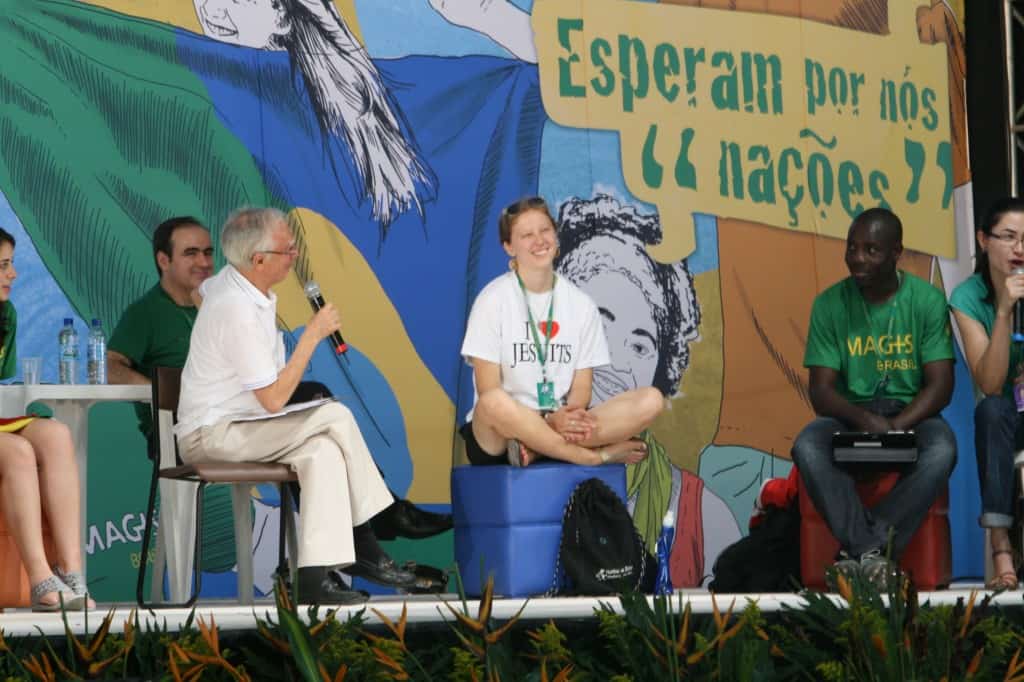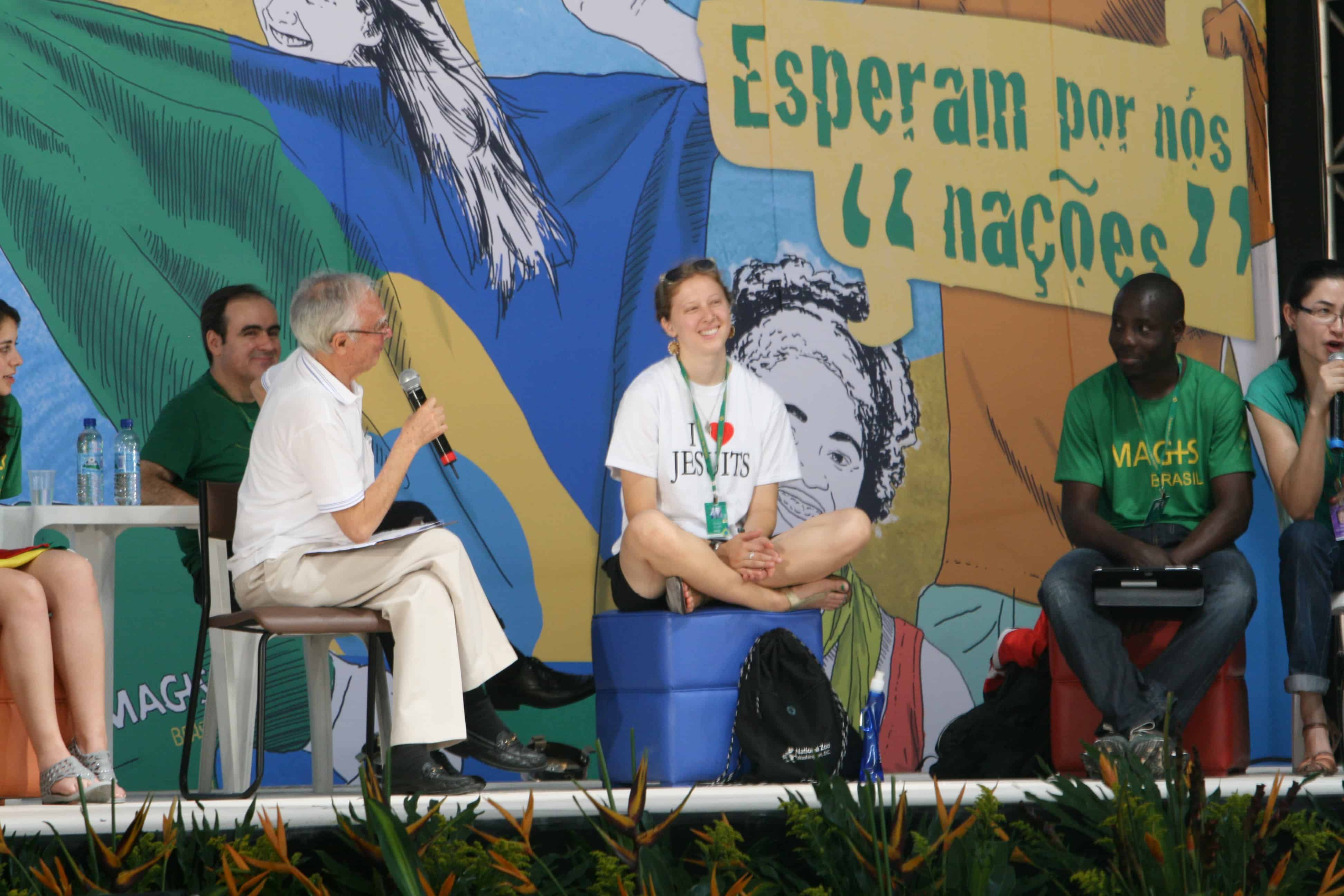What is Magis? It’s “more” … more dancing than we ever could’ve imagined. More flashmobs1, more styles of Brazilian dance than we could’ve imagined2, more chest-pounding bass, and as a result, more excitement than we ever expected.
But there is also more than dancing: occasionally a discussion on faith and spirituality does break out. When it does, it goes deep, fast. Young people are asking for “more” from the Church, and often doing so in language that the Church may have trouble recognizing, but needs to hear.

Jesuit theologian João Batista Libanio, SJ challenges students in panel discussion, including US pilgrim Emma Scuglik from Marquette University.
On the second day of the Magis gathering, after the morning Mass, pilgrims gathered for a discussion, moderated by liberation theologian João Batista Libanio, SJ, on the topic “To be young in today’s world.” In Portuguese, Spanish, and English, we had pilgrims from India, Brazil, Spain, Lebanon, the USA, and many more countries sitting on stage to share their own understanding of the issues and opportunities for young people today. (And a team of translators typing into computers rigged to projectors so that the many more hundreds of people in the audience could follow what was being said.)
Our TJP team was there live-tweeting the whole discussion, and it started out normally enough. The speakers on stage said encouraging things about the role faith played in their lives and should play in society:
“Language should never be a barrier. Actions speak louder than words.” – #MagisBrasil pilgrim from India.
— TJP On Tour (@TJPOnTour) July 13, 2013
“My role is to live with a Muslim person, not to judge, and in that way to show God’s love.” – #MagisBrasil pilgrim from Lebanon
— TJP On Tour (@TJPOnTour) July 13, 2013
It’s our responsibility … to live our faith and not to be afraid to show it everyone else. – #magisbrasil pilgrim from USA
— TJP On Tour (@TJPOnTour) July 13, 2013
But the moderator wanted to push the discussion further, so he asked about Jesus.
Question from Jesuit moderator: but no one has talked about Jesus. What does Ignatian spirituality have to do with Jesus? #magisbrasil
— TJP On Tour (@TJPOnTour) July 13, 2013
And all of a sudden — though no one put it so explicitly — we were listening to a discussion about theological anthropology and the Incarnation and about what kind of Christology was necessary in today’s world. A common theme from the young people was that they encountered Christ by reaching out to other people in love.
When we reach out to other people, we are reaching out to Christ, so Ignatian spirituality has a lot to do with Jesus. #MagisBrasil
— TJP On Tour (@TJPOnTour) July 13, 2013
Any encounter out of love with a person in need is an expression of God’s Word. -Aussie youth at @magisbrasil conference @Magis2013USA
— Jason Welle, SJ (@malawijay) July 13, 2013
Still not satisfied, the moderator pushed the conversation forward from Christology to ecclesiology, and we heard again about the importance of demonstrating faith by living it out.
Jesuit moderator: very beautiful to talk about God in general, but about Jesus more difficult. And what about the Church? #MagisBrasil
— TJP On Tour (@TJPOnTour) July 13, 2013
People say the Church is not in fashion, but we must show a real face of love in language people speak, incl. social media. #MagisBrasil
— TJP On Tour (@TJPOnTour) July 13, 2013
Student response: to be the church, to show church in our actions is how we talk about the church #magisbrasil
— TJP On Tour (@TJPOnTour) July 13, 2013
Students response: We are all part of the living church, but we also have to uphold the structure of church. It unifies us #magisbrasil
— TJP On Tour (@TJPOnTour) July 13, 2013
After the panel discussion ended, TJP’s Jason Welle had a chance to interview several of the pilgrims from U.S. Jesuit universities about their impressions and reactions to what they heard. The theme of actions speaking louder than words and the importance of demonstrating the reality of lived faith again came through clearly.
The moderator’s concerns about whether or not the young people are able and willing to speak explicitly about Jesus and the Church are important, vital questions. But if they lead us to respond by correcting their theological terminology to the point that they can no longer recognize their own experience in it, then they will be lost in the background noise.3
What we heard in the panel discussion and in the interviews afterwards is that the effort to instill doctrine and theology ahead of demonstrating its living credibility — no matter how correct, how true, that doctrine is — has failed and will fail comprehensively. No amount of abstract truth can correct the failure to live the gospel fully.
For that is what these young people are asking for, even if they may not have the words to ask explicitly. They are asking for a more demanding gospel and for a more transformative Christianity. They are asking us to live out in action — and joyfully — the claims that we believe God makes on our lives and that we teach that God is making on theirs. That lived faith will be what leads us to a better, deeper, and more explicitly Christian theology.
The mistake would be to hear the call for action as an unwillingness to talk about Jesus directly, when it is actually a recognition that too much talk about Jesus can be a way to avoid actually having to live like Jesus. And too much focus on the structures of the Church can be a way to avoid the costly demands of loving one another in community. The gospel requires more from us; in fact, it requires all from us.
It can be tempting to write off the desires of young people as lacking theological sophistication.4 But that misses what God has to say to us through those desires. They are not opposed to a robust theology; rather, they are crying out for a more transformative faith. That is what these young people, here at Magis and back at home, are asking for. That is also — and this is not a coincidence — what God is asking for.
— — // — —
- Actually, “flashy mobbies.” Yes, you read that right. As we have discovered, Portuguese is allergic to ending words with consonants. You can ask our Associate Editor Erick-y Sundrup about it, he finds it utterly endearing. It’s also why we struggle so much to say anything more complicated than “obrigado.” Apologies, by the way, for U.S. viewers since the YouTube video of the flashmob has been blocked for use of the song “Wonder.” Please call your Congressperson about copyright reform if you’d like to watch the Magis version. It still plays in Brazil, though! ↩
- And thank God, it’s more than we imagined. The diversity and richness on display at Magis is breathtaking! ↩
- You remember what Charlie Brown’s teacher sounded like, right? ↩
- If you are tempted to put anything in the comments — or even to say to yourself — that sounds like “these kids and their rock-and-roll,” re-read the article carefully. Rinse and repeat as needed. ↩


